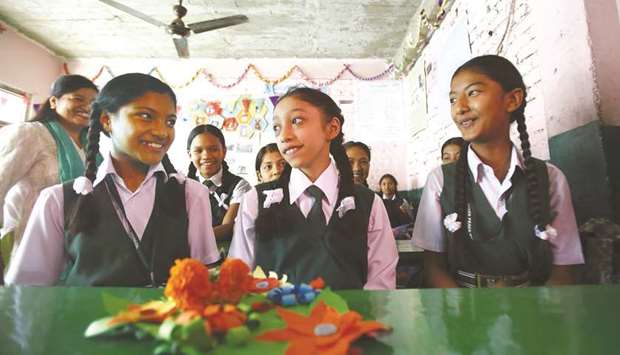Matina Shakya was only three when she was taken away from her parents to be a Kumari in Nepal’s historic capital. Yesterday she finally started school after puberty ended her nine-year reign.
Dressed in a green uniform and stripped of the heavy make-up she used to wear, Shakya, 12, looked like any other student as she walked into the Green Peace Co-ed School in Kathmandu.
Fellow students and teachers had gathered outside to welcome her, playing music and waving flags – a small reminder of the huge crowds she used to draw as Kathmandu’s Kumari.
“We are excited to have her with us, and we are discussing how to ease her and help her adjust in the new environment,” said principal Pema Yonjan.
The Kumari is a pre-pubescent girl who lives in a temple palace in the heart of Kathmandu as part of a centuries-old tradition and is considered the embodiment of goddess Taleju.
She only leaves the temple 13 times a year on special feast days, when huge crowds of worshippers gather to see her.
That means the Kumaris cannot attend school, and most have struggled to reintegrate into society after they retire.
But Shakya received private tuition following a 2008 Supreme Court ruling that the Kumaris should be educated.
Her father Pratap Man Shakya said she had attended nursery at the school and he was confident she would be able to adapt to her new life.
“We hope now that she is going to school in a good environment she will become an even better student,” he said.
Shakya was anointed as the Kumari in 2008, leaving her home to be cared for by specially-appointed guardians, and only retired last month as she neared puberty.
The tradition of the Kumari, originating from a word meaning princess in Sanskrit, comes from the Newar community indigenous to the Kathmandu Valley.
The most important Kumaris represent each of the three former royal kingdoms of the valley: Kathmandu, Patan and Bhaktapur.
The tradition was once closely linked to the royal family, but has continued despite the end of Nepal’s monarchy in 2008.
It has drawn criticism from child rights activists who say the Kumaris are denied a childhood and their isolation from society hinders their education and development.
Shakya was replaced by three-year-old Trishna Shakya last month.

Matina Shakya, centre, sits in a classroom on her first day of school in Kathmandu yesterday.
